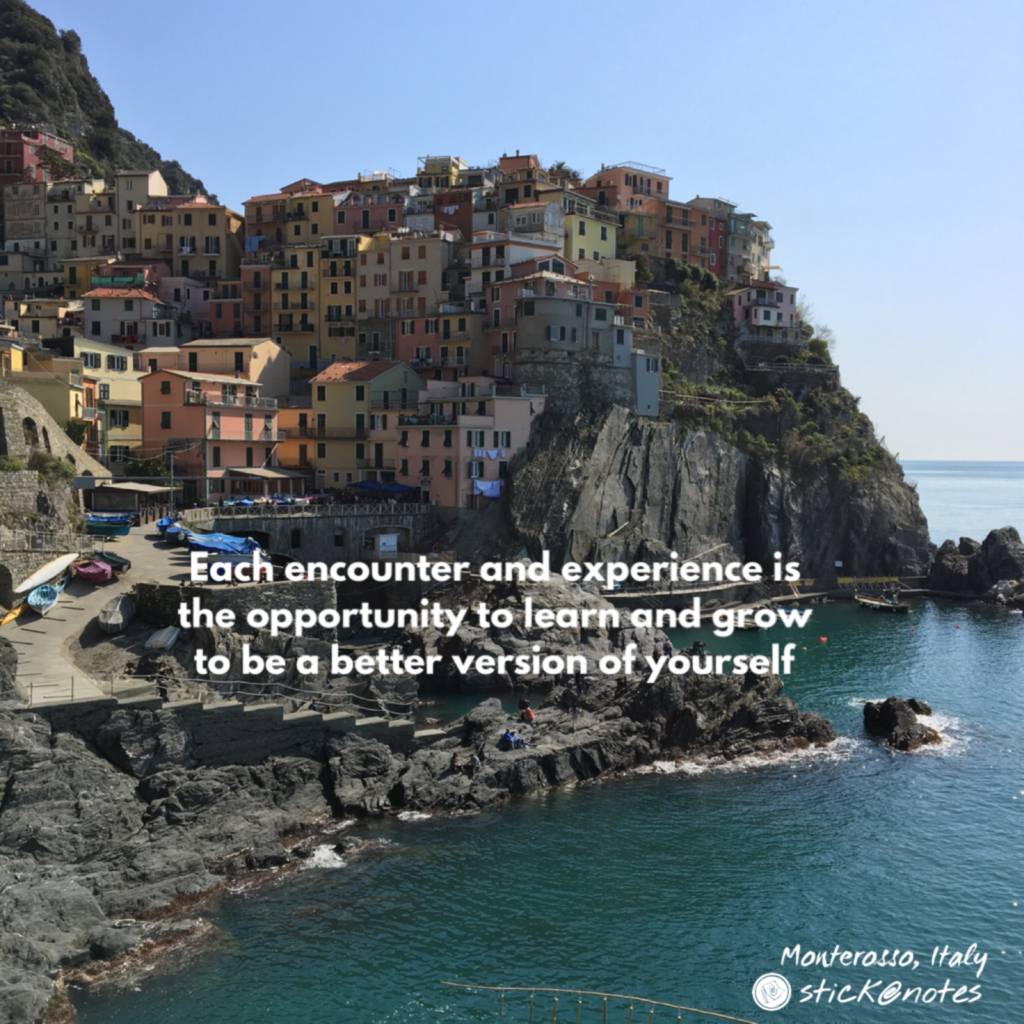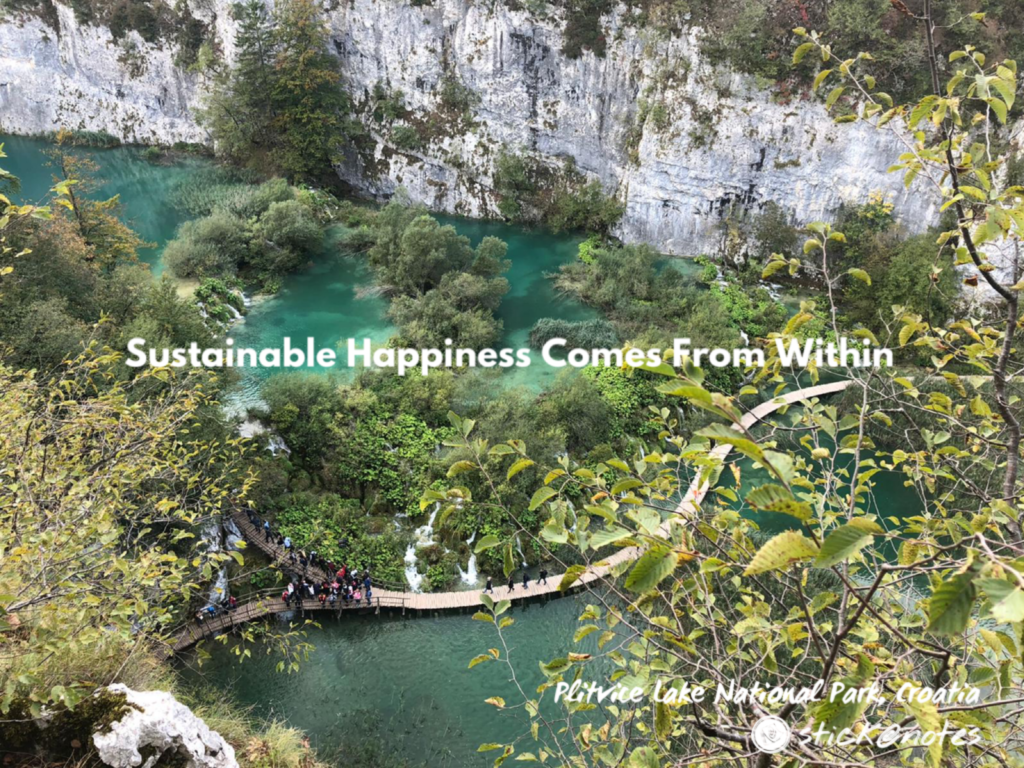-
Learning From Each Experience
Each one of us is wired to feel uncomfortable in a situation where we “perceive” as negative. And we tend to blame others, the past, or circumstances. We become easily annoyed and find excuses for any problems.
The longer this process repeats day after day, the more complex the problems we create within ourselves. In the end, nothing seems to go our way; everything seems wrong, and the accumulation of excuses, blames and negative feelings eventually catch up to us. We become extremely stressed out, anxious, depressed, and unhealthy.
The good news is, we are equipped with this amazing tool that is so called “feeling”. When we choose to be aware, our feeling functions like a “sensor” or cues. Notice when this sensor detects negative emotions such as anger, sadness, disappointment, or worries; and acknowledge it.
Before we let this negative feelings transition to hundreds of negative thoughts, practice asking this question: what do I have to learn from this experience? Do I need to take some actions or practice acceptance and changing from within?
To answer this question, first we need to classify if the circumstances we are facing is within or beyond our control.
I feel terrible, can I do something and change the situations?
If the answer is yes, by no means take some actions and do our best to change the things we can for the better. For example, you failed your exam because you were partying instead of studying the night before the exam; and you feel terrible about it. In this case, you learn that you have total control of the situations, need to take responsibility and work harder to be successful in anything you do.
What if I feel awful and can’t change the situations?
More often, however, you can’t really do anything about certain circumstances such as unforeseen change in life; nor others’ behavior, because they are just beyond your control.
You can’t really change a driver who cut in front of your car, nor your colleague who is always angry. Instead of letting negative emotions consume you, adjust how you react to those circumstances that are beyond your control. You may learn to be more patient, adaptable, or accepting. You may also learn why letting go is the key to a happier you.
We can learn various things in many different ways, but life experience is one of the best teacher if we allow it to be. By letting our feeling as compass to happiness, each encounter and experience is the opportunity to learn and grow to be a better version of ourselves.

-
The Secret of Balance
We often hear that nothing is perfect; and it is not possible for a person to have it all. Bob is so successful in his career but his family is a mess. Katie is very smart and full of energy. She works more than 60 hours a week but her mental and physical health start to go downhill when she is in the late forties. We start to think that it is normal to be that way: we can’t have it all.
If we look into the above scenarios more carefully, the common denominator for Bob and Katie is that they spend too much focus in one aspect of life. And eventually, they experience negative consequences in the other areas of their life.
To illustrate the negative consequences of the extremes we need to look into all aspects of our life more carefully.
The Four Aspects of Life
There are four most important aspects of life where each one of them is tightly interconnected with the others: Self and spiritual, health (mind and body), family and friends, work and finance. Putting too much time and focus in one area is a surefire way to create problems in the other three. When we have all four aspects of life at a balanced state, we have reached a state where we have it all because our life is in harmony.
Self And Spiritual – The Foundation
In the midst of our busy life, we tend to put our “self and spiritual” wellbeing at a lower priority level. In reality, this aspect of life is the most important foundation to build a balance life. The way we understand and see our “self” determines how we approach the other aspects of life. Contented self is mindful, aware of feelings and thoughts that lead to happiness; and those that need changing within, and not without.
Giving time to self is essential for physical, emotional and mental health. It reduces stress, provides more positive energy and eagerness to work on the next tasks in front of you.
Setting aside “me” time each day can range from doing activities that you enjoy, such as praying, reading, listening to music, walking, to practicing mindfulness or meditating.
Practicing mindfulness, or self awareness, actually should be the priority of “me” time. It gives us the opportunity to build relationship with our inner self, and brings us to spiritual wellness.
The path to spiritual wellness allows us to connect the dots between experience, challenge, and life purpose; and helps us find deeper meaning of events in life. It also allows us to feel more connected to a higher power and other creations around us. We have more clarity when it comes to making everyday choices, and our actions are more aligned to our ethical values and principles.
The more we become aware of our inner self, the clearer to see what needs changing and improvement within. As a result, practicing self awareness helps us reaching and maintaining balance in all aspects of life.
The Interconnections
The interconnections among the four aspects of life is so tight that when we practice self awareness, we can identify any imbalances before it goes too far. Below are a couple of examples illustrating the consequences of imbalances touching the four aspects of life.
When we put too much focus on work and money, we become too exhausted to spend time with family and friends, not to mention the negative effects on our physical and emotional health due to stress, lack of sleep or exercise. On the other hand, lack of focus on career development prevents us from cultivating successful career, which may impact financial stability and self confidence.
Spending too much time caring for others but not enough “me” time can lead to mental and physical exhaustion. Likewise, having too much “me” time without doing something productive and purposeful tend to make us feel empty and unfulfilled.
Life is a journey to grow and be a better version of ourselves. Learning to attain balance is a part of this growth. Keeping all aspects of life in balance is the key to live this life to the fullest. It is the key to having it all. Strive to find a balance and we will live in harmony.

-
Our Feeling Is A Sensor
We are created so flawlessly with this tool called “feeling” to evaluate our daily encounters and circumstances. Without feeling, we might as well be robots, and life would be meaningless. We would be walking around without emotions. There would be no fun, no challenge, and no growth. Everything would be just….tasteless.
Feelings and Mind & Body
We react to situations which create positive feelings such as love, joy and excitement; as well as negative feelings such as anger, jealousy, disappointment, guilt, fear, or worry. The thoughts created by one or combinations of feelings, and vice versa, generate the most complex algorithm in our brain that even the most sophisticated computer apps is not able to imitate. There are too many variables going on in our mind that produce different results for each one of us.
Most of us have heard that healthy and happy mind create healthy body, while chronic stress puts our health at risk. No wonder why two people taking the same foods, drinks, or vitamins unlikely obtain the same results. Not only what we eat and drink, and how we exercise, but our cycle of feelings and thoughts are by far one of the most influencing factors to our health.
Feelings as a Sensor or Cues
How do we create healthy and happy mind? The mind that heals and keeps our immune system strong? What about using feeling as our sensor or cues, and “happiness” as the set point?
To do this, first we need to practice awareness – how we feel during our daily encounters. This means when we feel upset or sad, we shouldn’t run away from the problem by burying ourselves in our work, blame it on the past, or self-medicate with alcohol or drugs. Instead, use our feeling as a sensor or cues what attitude adjustment is needed for us to get back to feeling happy. We may have to learn to let go or forgive, accept the unchangeable, practice patience and humility, learn to give respect, or other virtues. Each time we are able to let go and/or adjust our attitude, we are one step away closer to the set point of “happiness”.
Practice Makes Perfect
This process is not an easy task at first. We have to be willing to adjust our perspective and mindset; and stop blaming others, the past, or situations for any negative feelings. While the adjustment process can be difficult and lengthy initially, it becomes our second nature eventually.
Soon enough we find previously annoying people or circumstances become less so, and negativity or judgement disappears. We find that we become calmer. Nothing really bothers us for more than a minute, because our control system (brain and awareness) is trained skillfully to adjust our attitude as our sensor (feeling) is a little off from the set point (happiness). At that point, we have achieved sustainable happiness. The type of happiness that comes from within.

